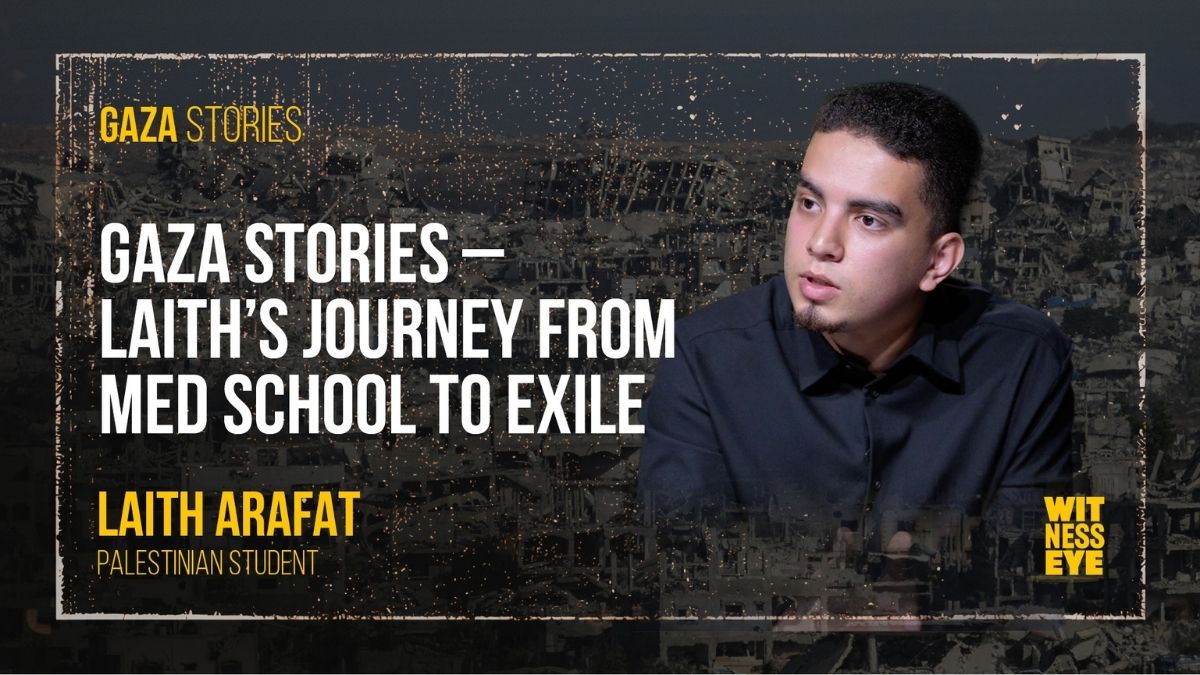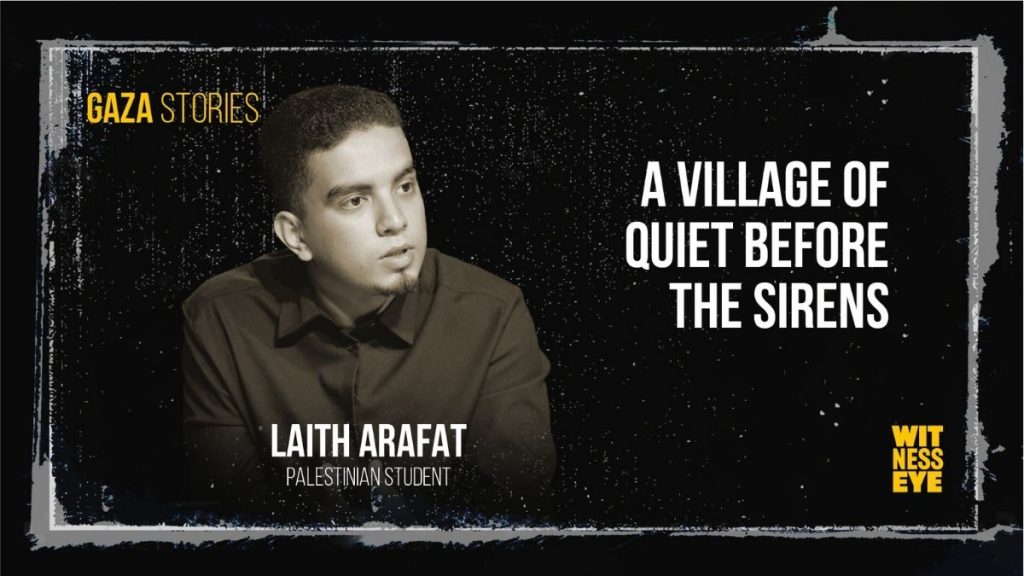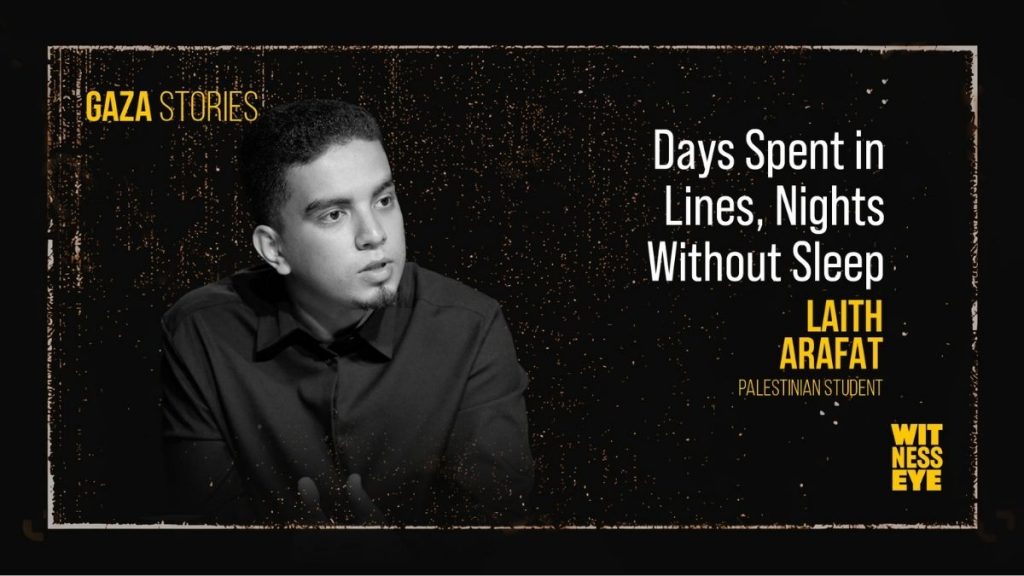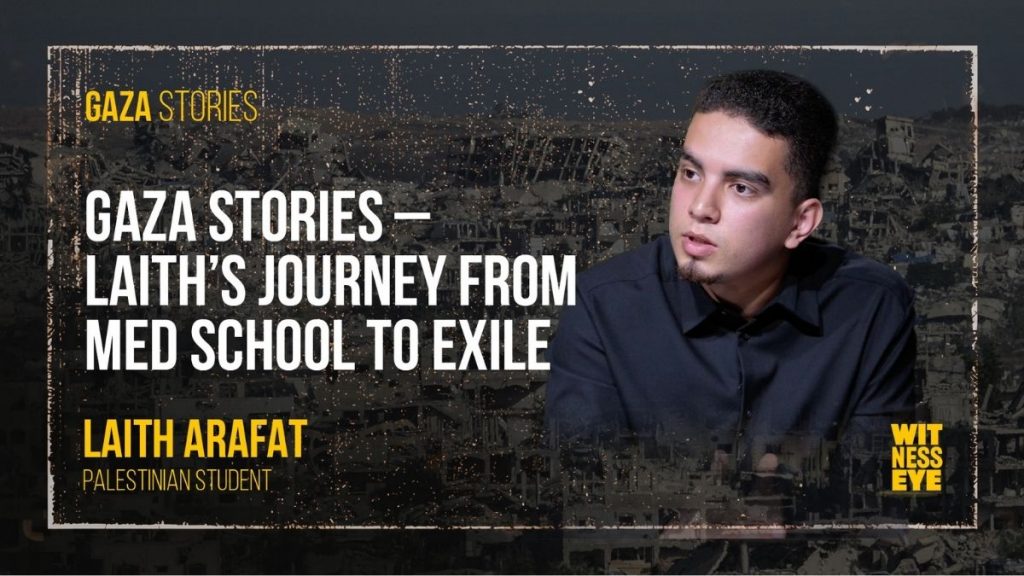
The morning felt ordinary—bag on his shoulder, tablet in hand, midterm notes open on the bus. But what followed became part of Gaza Stories, lived by Laith Arafat, a final-year medical student counting down months to graduation. Halfway to campus, the driver suddenly hit the brakes, turned the bus around, and started back the way they came. No one spoke at first. Phones buzzed. Eyes met and then dropped. Whatever this was, it wasn’t a drill. The day that started with pharmacology flashcards ended with families running for water and bread.
Laith is soft-spoken, the kind of person who measures words like he measures a pulse. He grew up in Absan al-Jadida, east of Khan Younis—a small agricultural town threaded with family homes and shaded courtyards. The village had a simple rhythm: neighbors checking on one another, tea in the afternoon, the easy order of a life built over decades. One tree holds it all together in his memory.
“My grandmother planted a guava tree fifty or sixty years ago. We met under it—coffee before university, tea after lunch, friends in the evening. When I saw the video of our neighborhood… I couldn’t recognize a single thing.”
He pauses when he says this, and you can hear the branch creak in his mind. For Laith, Gaza stories begin with small details—fruit, shade, a place to sit—and unfold into everything the war tore apart.

A Village of Quiet Before the Sirens
Absan al-Jadida sits a few kilometers from the border, the kind of place where family names map the streets better than signs. Laith lived among uncles and cousins, the air smelling of soil after irrigation. Like most border towns, the family stayed through past escalations—2014 carved deep, 2021 they did not evacuate—but this time felt different right away. By late morning on day one, people near the fence line were already moving. By day two, Laith’s family joined the stream.
“We took almost nothing. We kept telling ourselves, ‘Days and we’ll return.’ We didn’t pack enough clothes, not even the things we really needed.”
The sentence sounds harmless until you realize how many times it’s been repeated across Gaza: days and we’ll return. Then weeks pass. Then months. Then a video arrives from a cousin: the street you walked every day flattened into dust. Landmarks gone. Even the guava tree gone. “A house can be rebuilt,” Laith says, “but who replaces the memories?”

Days Spent in Lines, Nights Without Sleep
When ordinary life collapses, even simple needs become struggles. People who built homes brick by brick find themselves in lines that stretch for blocks. Laith says the first shock wasn’t the explosions—it was the waiting. Waiting for water, waiting for flour, waiting for news.
“I can’t forget those water lines. Sometimes I rode a donkey cart we call a ‘kara’—if you could even find one, and it was expensive. I carried cartons of food for my family, walking long distances. We’re dignified people. We aren’t used to this.”
He remembers a day when the aid truck never came. He remembers the heat pressing down in summer and the damp cold of winter sinking through thin clothes. He remembers the way silence grows in a crowd when rumors spread that a crossing closed again. Some nights, sleep was a rumor too.
Life in a Tent: Heat, Cold, and Shrapnel
Laith’s family has lived in a tent in al-Mawasi, Khan Younis, for about a year. “Safe area” is what the leaflets called it. The maps drew a box. Reality made a liar of every label.
“Less than a month ago, the tent next to my family’s was bombed. Just meters away. The woman inside was injured; her children were injured. A fabric tent—do you know what a rock can do to a tent? And they drop tons of explosives.”
Summer turns the tent into an oven; winter soaks everything. The sea breeze brings salt and insects. There’s no infrastructure, no sanitation, and clean water is a daily mission. Sometimes his mother hides the worst of it on the phone, but mothers can’t hide wind or waves. “She tells me not to worry,” he says.
Between Death and Birth at Nasser Hospital
When displacement brought Laith to Khan Younis, he volunteered in the women’s and maternity emergency at Nasser Medical Complex. The hospital was more than a hospital: wards full, corridors full, stairwells full—patients and displaced families sharing air, fear, and hope. The staff triaged constantly, a moving scale of pain and urgency. In those crowded rooms, he learned what it means to hold two truths at once: grief and grace, minutes apart.
“A mother came from under rubble to ask about her baby’s heartbeat. Not her own injuries—just the baby.”
One day he scanned a woman in her ninth month. He couldn’t find the fetal heartbeat. Another physician checked again and again. Nothing. “Imagine waiting nine months,” he says, “then you’re told your baby is gone.” People gathered to console her: entire families have been wiped out, please be patient. He still hears the sobs.
And then, a few days later, a different mother—years of infertility behind her. On the ultrasound Laith saw two small profiles. Twins. He swallowed his joy until a specialist confirmed it. “She prayed for us,” he says, smiling at last. “Life and death in one corridor.”
These moments aren’t just stories; they are eyewitness testimonies, human records that will one day sit beside Civilian Impact Reports, War Crimes Documentation, and the long work of Forensic Investigations. Hospitals like Nasser carried both the wounded and the displaced, and every case can become part of a Digital Evidence Archive or a Civilian Casualty Mapping effort. Laith knows the language: International Humanitarian Law, Crimes Against Humanity, Destruction of Civilian Infrastructure. He prefers simpler words, mother, baby, twins, but he understands why the legal terms matter. They protect memory from being erased.

Gaza Stories – Losing Friends Without Goodbye
In diaspore, Laith learned that grief has a different shape when you’re far away. He found out about his cousin’s death over the phone, the cousin who shared a room with him for a month when they were displaced to Bani Suheila. They ate from the same plate, pulled the same blanket to their chins at night, planned to celebrate graduation together. Another cousin died in a massacre in Greater Abasan. There were friends too many to count.
“There are times you don’t get to say goodbye. You don’t get a last look. You just hear the news and hold it.”
He tells a story about a “belt of fire” a series of rapid, heavy strikes hammering a neighborhood. The windows shattered into the room where they were waiting. The house lurched and breathed and then held. “In those seconds,” he says, “you feel time stretch. You count breaths and ask, Will we survive this minute?”
Bodies That Cannot Bear Fear
We usually think of killing as blast, bullet, blade. Laith, now a doctor, says bodies also fail from cold, from hunger, from terror.
“I left Gaza after six months and I had lost eight kilos, even though I ate better than many.
There is famine now. There are people who die from lack of food, from contaminated water. Hearts can stop from fear. My friend, her heart stopped. She left two little girls.”
He talks about patients with cancer who lost access to treatment, kidney patients who couldn’t get dialysis, chronic diseases unmanaged for months. He mentions the Turkish Friendship Hospital, the only oncology center equipped for cancer care, blown up and erased. He says the words slowly—human rights violations in Gaza aren’t concepts to him; they were neighbors.
Carrying Gaza With Him
A partnership between his university in Gaza and Istanbul Medeniyet University opened a door for final-year students to finish their degree in Türkiye. Laith took it.
“You stand between two fires. Leave your family in this? Or finish your training so you can come back as a specialist—so you can actually help?”
He calls it a duty—national and spiritual. He knows colleagues detained from hospital wards, tortured, injured, killed. He says their names with respect, then folds them carefully back into his chest like a note he can’t lose. The question isn’t if he’ll return; it’s when. “Gaza needs every specialist,” he says. “Every skill. Every set of hands.”
The Student Alone in a Foreign City
Diaspora has a way of aging a person. Laith says this year added ten to his face. He manages classes, a new language, rent, paperwork, and the quiet ache of surviving when the people you love are still inside. For him, Gaza Stories are not abstract headlines—they are lived moments of diaspora, hunger, and loss. Each day of study abroad is another Gaza Story he carries quietly, another reminder of what survival really means.
He asks the world to see students like him clearly. Many have families whose income vanished or barely covers food at today’s inflated prices. What helps? Material support, yes—scholarships, stipends, rent relief. But Gaza Stories also show the need for psychological care and community: a familiar voice, a kitchen table, someone saying, sit, eat, tell me about your day. Laith still jumps at fireworks because the sound lives in his nerves. These Gaza Stories will one day matter before the Gaza Tribunal, proving that trauma doesn’t simply pass like a season—it lingers, it demands justice, and it needs tending.
Bearing Witness, Building Cases
Laith’s memories don’t end at narrative. They brush against accountability. He talks about Gaza Tribunal Reports, Gaza legal review, and future Legal Accountability Cases that may rely on Social Media Evidence collected by volunteers and journalists—clips, timestamps, geolocations. Many of these efforts, from Witness Eye to larger projects tracking Gaza’s Missing and Genocide Evidence Files, are building a lattice that could support international justice.
![]()
The Guava Tree, Again
We end where we started: under the guava tree. Laith swears everyone in the town ate its fruit at some point; the tree outlived arguments and exam seasons, summer heat and winter rain. His grandmother has passed, and the tree—her last living gift—has fallen too. That’s the kind of loss that doesn’t appear in Military Conduct Analysis or a Gaza Tribunal evidence list, but it explains why people return to rubble the minute tanks pull back. “Why do Palestinians go home right away?” he asks. Because love grows roots you can’t pull out.
“You’re amazed by the steadfastness of people in Gaza. Just when the Israeli occupation withdraws from the place, people return immediately to what? To rubble. That’s right. Why? The Palestinian’s love is tied to his land and cannot be uprooted.”
What Keeps Him Going
Ask Laith what gives him strength and he’ll answer without searching. Love of country. Love of people. Obligation. He pictures the hospital corridors in Gaza not as they are now, but as they could be—clean, stocked, staffed by specialists who left and came back. He imagines wheeling a new ultrasound machine down a hallway, opening a clinic, teaching a younger doctor how to listen with both the instrument and the heart.
He also names the simple things he misses: the morning coffee under a tree, his mother’s voice not carried by signal delay, the way a street smells after rain. He’s realistic about the road—permits, borders, rebuilding—but he doesn’t place his hope in paperwork.
Carrying Gaza’s Wounds, Bearing Gaza’s Hope
Gaza stories aren’t headlines to him; they’re personal maps to a future where the hospital is a place of care again, not a shelter of last resort. Where Eyewitness Testimonies have been heard, where International Humanitarian Law means something, where Gaza justice isn’t a phrase but a practice. Until then, he keeps studying, keeps calling home, keeps adding to the living archive of a people who refuse disappearance.
Now, Hear the testimony of Laith Arafat in his own words—student, doctor, witness—carrying Gaza’s wounds and its steadfast hope into the record of justice.
Stay Connected with Witness Eye
Follow us on our official channels:
